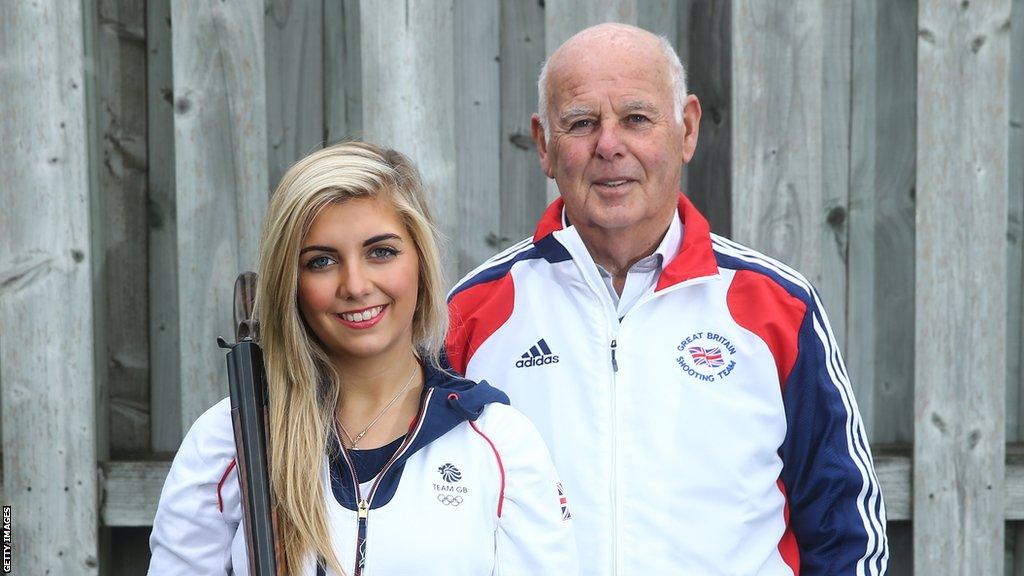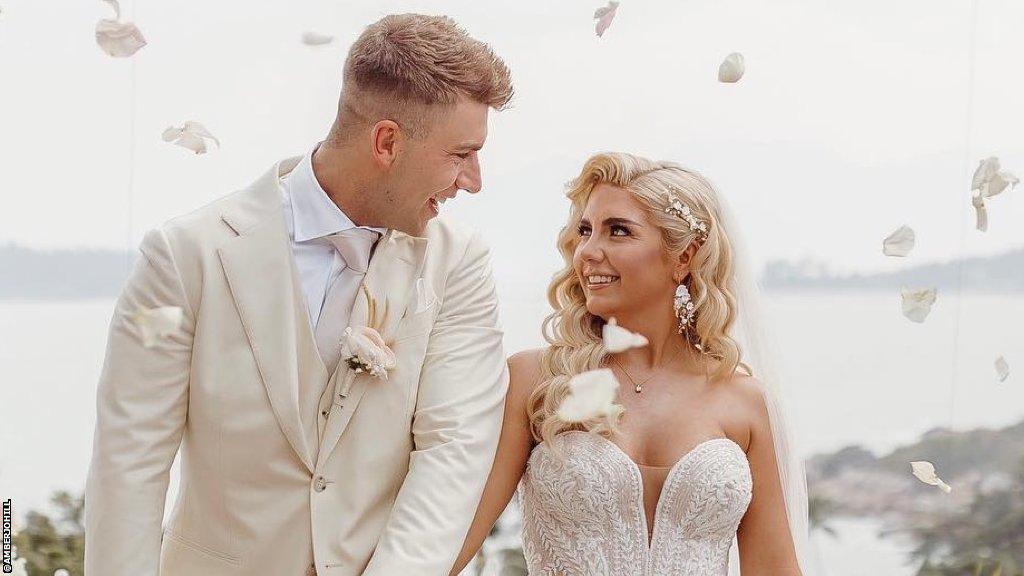Amber Rutter: Overcoming anxiety and depression after Olympic heartache
- Published
British shooter Amber Rutter on dealing with mental health
"My bags were packed, it was my last Covid test before I could get the flight to the Olympics and then the faintest of lines came up," recalls Amber Rutter (previously Hill). "My heart just sank and I knew my dream was over."
The English shooter was ranked world number one at the time and was seen as one of Team GB's leading Olympic gold-medal contenders.
However, on 21 July 2021, two days before the postponed Tokyo 2020 Games began, Rutter made unwanted history by becoming the first and only member of the British team to withdraw from an Olympics because of a positive Covid-19 result.
"I dropped to my knees and cried for what felt like weeks," she tells BBC Sport. "In the following months my mental health really started to take a dive."
A teen star, her grandfather and overcoming 'guilt'

Amber Rutter's grandfather Bill Rogers was a key part of her career
Rutter began fantasising about winning an Olympic medal soon after tagging along with her grandfather, Bill Rogers, to a local shooting range in Berkshire and first picking up a shotgun at the age of 10.
Together they had plotted her career, with Bill always her biggest supporter.
In 2013, at the age of 15, she became the sport's youngest World Cup champion, which led to her winning the BBC's Young Sports Personality of the Year Award.
Two years later came gold at the inaugural European Games and her grandfather cheered her on to Commonwealth as well as world honours in the following years - even attending events in his wheelchair after being diagnosed with cancer.
Bill died in 2019 and Rutter aimed to honour his legacy with the Olympic medal he had always told her she was capable of winning.
The tears were still flowing as she dragged herself from the floor, trudged downstairs - trying not to look at her packed Team GB kit laying next to the door - and joined her family who had paused Love Island while she disappeared to conduct the test in private.
She was feeling a combination of personal devastation and "guilt" for her family and grandad who had supported her journey for more than a decade.
"Telling them it was over, with my bags packed waiting for the 6am taxi to the airport the next morning, was definitely the worst moment of my life, she says.
"Everyone just broke down in tears with me."
The following weeks offered little respite, with her emotions varying from "devastation" to "anger".
"I did turn off the TV for most of the Games because every time I saw it, it did bring back some hard memories and I was struggling with anxiety," Rutter says.
"At night I couldn't sleep because I got myself into quite a bad place where I hated and resented everything to do with the sport.
"I wanted to quit, but I felt guilt for my grandad because it was our passion together and he wouldn't have wanted me to feel this miserable and unhappy.
"There were real waves of depths and highs that I went through because I didn't know what the future looked like, because shooting was my life but I'd got myself into such a dark place with a lot of sadness and depression."
Seeking counsel and a stunning comeback
Rutter began "working through things" with a psychologist and returned to the sport last year.
"My grandad would have said 'look to the future and don't give up just yet' so I kept pushing but a lot of it (competing again) was initially for financial reasons.
"I had a house and bills to pay for and the financial stress wasn't helping the whole mental health side of things."
While Rutter, who was sixth at the Rio Olympics in 2016, was still trying to rediscover the love she once had for the sport, there were no signs of that internal conflict in the competition arena.
She claimed World Championship medals, including team gold, as well as three European titles and secured a berth for Great Britain in her event - women's skeet - for Paris 2024.
"It was my most successful year to date," she states proudly.
"But still, when I was there, I was in tears a lot and wanted to pull out of the competitions a day before because I didn't want to be travelling the world.
"As the competitions went forward, I started to get a bit of momentum and direction and with the support of an amazing team, success slowly started to feel more meaningful."
'My life no longer centres on the Olympics'

Amber Hill married long-term partner James Rutter at a "dream" ceremony in Thailand
In February the now 25-year-old married long-term partner James Rutter at a "dream" ceremony in Thailand and feels her experiences over the past two years have given her greater perspective.
"Tokyo has really given me a real reality check and made me realise that you're a person before you're an athlete," she says.
"I felt like I was planning life for eight years in advance working around an Olympics, which is really just two days of my life and I'd put so much on hold.
"Right now, I'm really happy with marriage and with the idea of starting a family because these are really important things to me."
Her European success in 2022 all but secures her a place at the Paris 2024 Olympics, but Rutter is taking a more relaxed approached to these Games than the previous two and says she will only head to France if she believes it will improve her wellbeing.
"The idea of winning an Olympic medal has slightly changed for me and I would be lying to say that it was everything that I wanted to achieve now," she adds.
"Yes, it would be life-changing, but I'm really prioritising happiness and the things that I want to do with my life first.
"If the Olympics fits into my plans, then I'm sure it'll be amazing."
If you have been impacted by issues discussed in this article, then please visit the BBC Action Line.
Rutter chose 'Mental Health Awareness Month' to speak out about the challenges she has faced in the hope it will encourage others who are struggling to seek help.

What haunting secrets are buried Inside No. 9?: Darkly twisted comic tales from Steve Pemberton and Reece Shearsmith
Which pair will finish first?: A frenetic race across Canada without phones and flights
